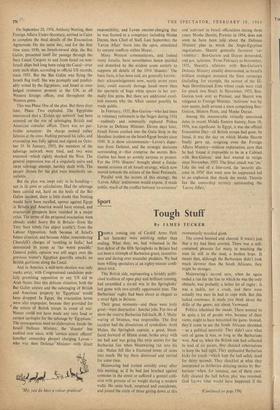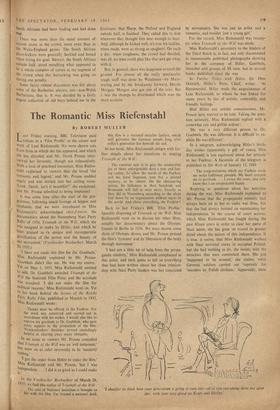Sport
Stuff Tough
TUCKER By JAMES PEOPLE coming out of Cardiff Arms Park last Saturday were smirking rather than smiling. What they, we, had witnessed in the first defeat of the fifth Springboks in Britain had not been a triumph of Barbarian grace, inventive- ness and daring over muscular plodders. We had been willing spectators at an eighty-minute confi- dence trick.
This British side, representing a lavishly publi- cised tradition of open play and brilliant running, had scrambled a six-nil win in the Springboks' last game with two scruffy opportunist tries. The Barbarians' rugby had been about as elegant as a street fight in Brixton.
Their great moments—and these were truly great—were destructive : hatchet jobs. For two of them the reserve Barbarian full-back, H. J. Main- waring of Swansea, was responsible. The first incident had the dimensions of symbolism. Avril Malan, the Springbok captain, a great, blunt- faced forward of fifteen stone, broke away with the ball and was going like twin screws for the Barbarian line when Mainwaring ran into his side. Malan fell like a fractured tower of coins into touch. He lay there distressed and unvital for some time.
Mainwaring had trotted amiably away after this meeting, as if he had just brushed against someone in the street or suffered a genteel colli- sion with persons of no weight during a modern waltz. He came back, surprised and considerate, and joined the circle of those gazing down at this momentarily wrecked giant.
The crowd beamed and cheered. It wasn't just that a try had been averted. There was a self- contained pleasure for many in watching the man lie still in the mud, a broken hope. It meant that, although the Barbarians didn't look much cleverer than the South Africans, they might be stronger.
Mainwaring's second save, when he again ended a run for the line to which he was the only obstacle, was probably a better bit of rugby : it was a tackle, not a crash, and there were actually two men he had to cope with. But this lacked overtones. It made you think about the skills of the game; not about Verwoerd.
Politics inhabited the stands. There seemed to be quite a lot of people who, because of their views, ought to have boycotted the game. Instead, they'd come to see the South Africans shredded —as a political necessity. They didn't care what sort of game it was, as long as the Barbarians won. And so, when the British side had collected its lead of six points, they shouted exhortations to keep the ball tight. They applauded Barbarian kicks for touch—which kept the ball safely dead for thirty seconds. They chuckled at what they interpreted as deliberate delaying tactics by Bar- barians—when, for instance, one of them care- fully cleaned the ball before play was resumed. God knows what would have happened if the (Continued on page 179)
South Africans had been leading and had done that.
There was more, than the usual amount of venom about in the crowd. more even than in the Wales-England games. The South African Place-kickers were generally heckled and booed When trying for goal. Stewart. the South African outside half, stood mouthing what appeared to be a whole complex of curses at my segment of the crowd when this barracking was going on during one penalty.
Some fairly violent discontent was felt about some of the Barbarian players, too—non-Welsh Barbarians, that is. It was decided by a fairly august collection of old boys behind me in the Enclosure that Sharp, the Oxford and England outside half, is finished. They called this to him whenever they thought him near enough to hear. And, although he kicked well, it's true his tackles, when made, were as strong as spaghetti. On such a day, when toughness, the crowd had decided, was all, no man could play like that and get away with it.
But, in general. there was happiness around the ground For almost all the really spectacular tough stuff was done by Welshmen—by Main- waring and by the breakaway forward, Haydn Morgan. Morgan also got one of the tries. But was the thumps he distributed which won the most acclaim.











































 Previous page
Previous page